The International Online Symposium on Shakespeare, Milton and European Literary Traditions was held from October 30 to November 1, 2020. Approved by the Ministry of Education, the symposium was co-organized by the Center for Medieval and Renaissance Studies of School (CMRS) in School of International Studies (SIS) of Zhejiang University together with the research team of the major projects supported by National Social Science Foundation (19ZDA298) on “the Collection, Translation and Research of Milton’s Works”. The conference welcomed a total of over 60 representatives and some 200 students and scholars from universities home and abroad, including the Universities of Oxford and Bangor (UK), Northern Illinois University and Villanova University (USA), Kyorin University (Japan), Fu Jen Catholic University, National Chung Cheng University, Chinese Culture University (Taiwan, China), Peking University, Tsinghua University, Shanghai International Studies University, Nanjing University, Beijing Normal University, Nankai University, Sun Yat-sen University, Shanghai Jiao Tong University, Shanghai University of Finance and Economics, Southwestern University, Henan University, Jilin University, Zhejiang University, etc. It was also the fourth academic forum held by the CMRS since its establishment in 2016.
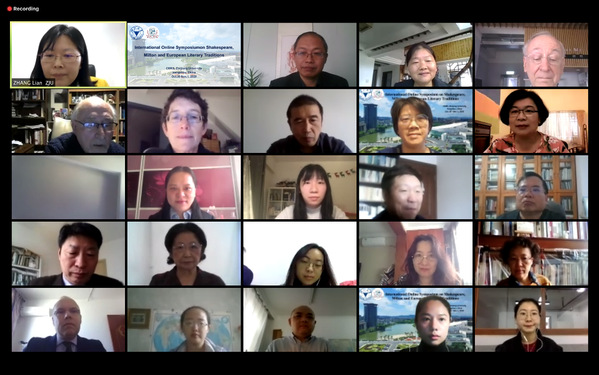
The Opening Ceremony
Host of the opening ceremony, Prof. Hao Tianhu, Director of the CMRS, firstly gave an introduction to the guests of the symposium including four international advisors of the Center, namely, Prof. Lorna Hutson of University of Oxford, Fellow of the British Academy, Prof. Thomas N. Corns of Bangor University, FBA, Prof. Nicholas Koss of Fu Jen Catholic University, and Prof. William Baker of the University of Illinois, among whom Prof. Hutson was invited to give the opening speech and had agreeably accepted the position as an international advisor to CMRS. Also present were Prof. Yoshiko Kawachi of Kyorin University, Prof. Lauren Shohet of Villanova University, Prof. Tom Rendall and Prof. Chen Ming of Peking University, Prof. Wang Lixin of Nankai University, Prof. Yu Shiyi of Tsinghua University, Prof. Wang Ming-Yueh of National Chung Cheng University, Prof. Zhang Yan of Beijing Normal University, Prof. Cong Cong of Nanjing University, Prof. Wang Xin of Shanghai International Studies University, Prof. Liu Jianjun of Shanghai Jiao Tong University, Prof. Sandro Jung of Shanghai University of Finance and Economics, Prof. Li Weifang of Henan University, Prof. Luo Yimin and Prof. Liu Lihui of Southwest University, Prof. Yang Lingui of Donghua University, Prof. Chen Maolin of Hangzhou Normal University, Prof. Shen Hong of Zhejiang University (in no particular order). Prof. Gao Fen, Director of the Institute of Foreign Literature, wished the symposium a complete success in the opening speech.
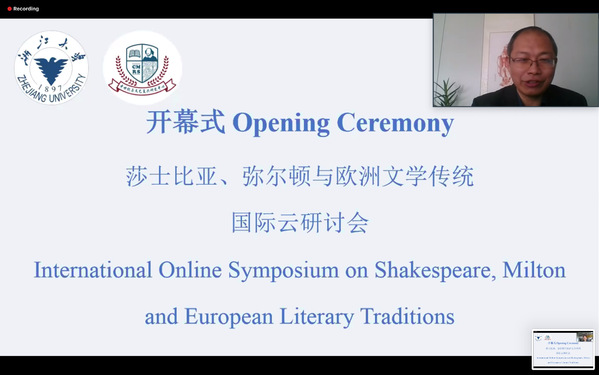
Prof. Hao Tianhu Giving Introduction to the Guests
On the first day, Prof. Thomas N. Corns of Bangor University, an international Milton expert and Fellow of the British Academy, delivered a keynote speech on Milton and his impact on the ancient and modern traditions, pointing out that the works of Milton not only inherited the literary traditions of ancient Greece and Rome, but also drew from the Bible, Italian epic poetry, and English vernacular literature, including the works of Spenser and Shakespeare. He then cited the 1671 edition of the collection of Paradise Regained and Samson Agonistes as an example by analyzing its contradictorily combined allusion to the classics and the Bible. His eloquent and vivid delivery intrigued a bunch of listeners. The speech came to a conclusion after the joyful discussion between Prof. Corns and Prof. Hao Tianhu, Prof Wang Mingyue and Prof. Sandro Jung upon a variety of interesting topics.
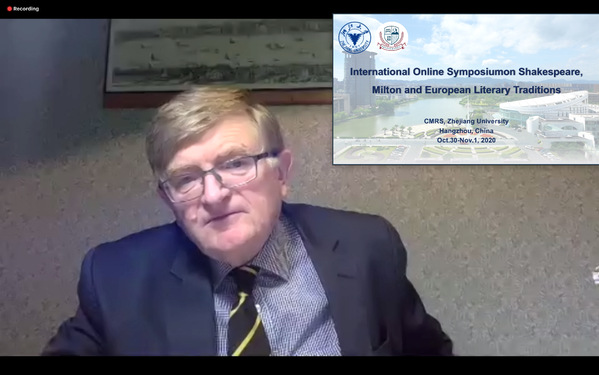
Prof. Thomas N. Corns Delivering Keynote Speech
Several domestic and international scholars have also rendered excellent speeches on the symposium under the host of Prof. Yoshiko Kawachi and Prof. Wang Xin. For example, Prof. William Baker of Northern Illinois University reviewed George Henry Lewes’ (1817-1878) interpretation of Hamlet, Othello, Cymbeline, Julius Caesar and As You Like It with Julia Kristeva’s theory of intertextuality to explore the relationship between Shakespeare and the European tradition. Prof. Lauren Shohet of Villanova University explained how Shakespeare juxtaposed ancient Rome, England and Italy in Renaissance period, Britainof the Roman Empire in his work Cymbeline with an intersectional approach in the Culture and Information Theory, and re-examined the critics, performers, and audiences of Shakespearean then and nowadays. Prof. Tom Rendall of Peking University focused on the reality and fabrication in Don Quixote and A Dream of Red Mansions and investigated how their authors, Cervantes and Cao Xueqin, criticized the society through their works. Prof. Nicholas Koss of Fu Jen Catholic University probed into the cultural dissemination and fluidity of the 21st-century edition and the English translation version of The Travels of Marco Polo in a detailed manner. Finally, Prof. Sandro Jung of Shanghai University of Finance and Economics conducted an in-depth analysis on the illustrations in The Faerie Queene drawn by Thomas Stothard, an 18th century illustrator, and how the illustrations reflected the reading experience of Thomas Stothard.
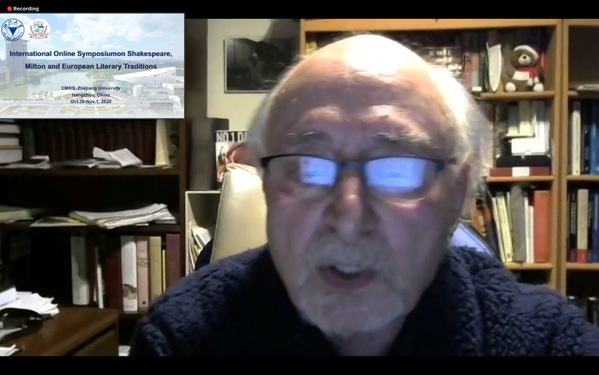
Prof. William Baker Delivering a Speech
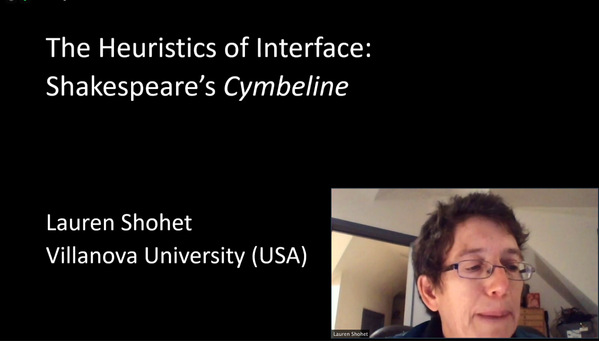
Prof. Lauren Shohet Delivering a Speech
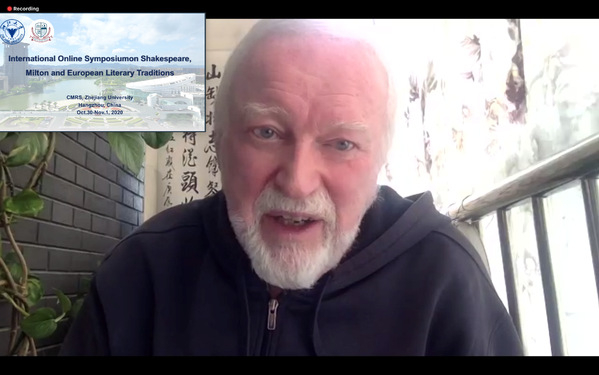
Prof. Tom Rendall Delivering a Speech
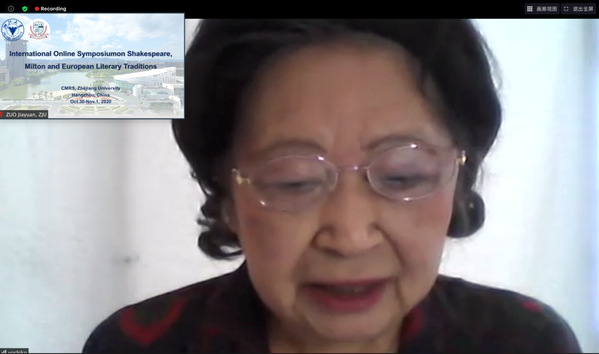
Prof. Yoshiko Kawachi, Host of the First Seminar
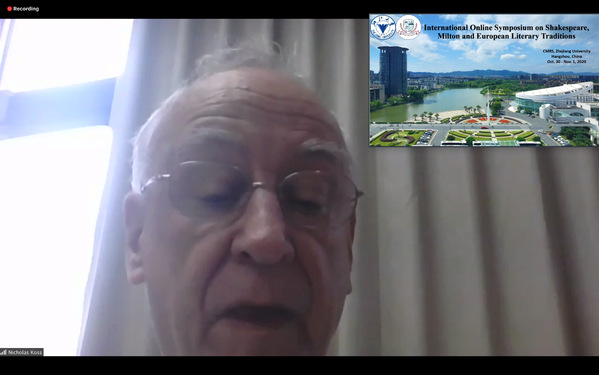
Professor Nicholas Koss Delivering a Speech
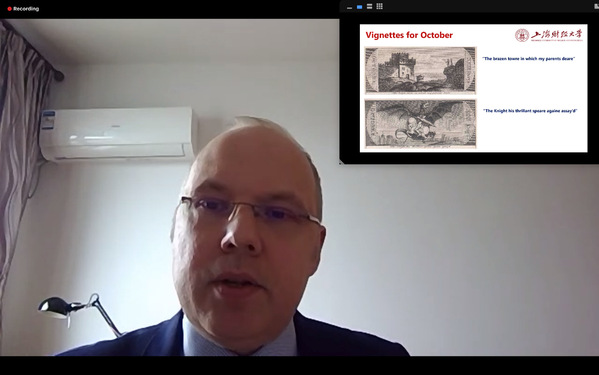
Prof. Sandro Jung Delivering a Speech
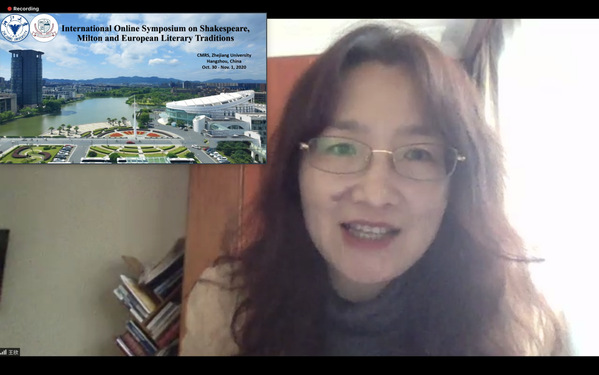
Prof. Wang Xin, Host of the Third Seminar
Prof. Liu Jianjun of Shanghai Jiao Tong University discussed the culture display and abandoning style of writing in the early Byzantine period with the example of The Ethiopian Story, pointing out that the book developed a new form of medieval romance novels while inheriting the advantages of ancient literature. Prof. Chen Ming of Peking University expounded on the illustration named “Man Fleeing the Unicorn” in the 14th century Greek book Barlaam and Ioasaph (BNF MS Gr.1128) in the Bibliothèque Nationale de Paris and its concerning stories with a detailed investigation on its cross-linguistic, cross-cultural, and cross-religious transmission, providing a model of rich connotation for mutual appreciation and understanding between Eastern and Western civilizations. Prof. Wang Lixin of Nankai University demonstrated the significance and value of Sinai narrative to Hebrew literature and cultural traditions through analyzing the narrative structure and concepts of relevant specific texts with The Ten Commandments as the core. Prof. Yu Shiyi of Tsinghua University discussed the ideal human nature in Utopia written by Moore and its interpretation in the Chinese context based on its Chinese business edition translated by Dai Liulin combining its English translation and original Latin text. Prof. Wang Ming-Yueh of National Chung Cheng University adopted the perspective of natural ecological literature to examine the lively and energetic life of Adam and Eve as gardeners in the Garden of Eden and Milton’s fabulous imagination of natural cradles of life such as air, water, soil, sunlight, etc. in Paradise Lost, thus highlighting Milton’s great contribution to the literature of natural ecology. Li Weifang of Henan University traced the sources of the play of revenge Titus Andronicus of Shakespeare and cast light on the author’s ingenuity and creativity and the artistic value of his adaptation that had surpassed the original text. Prof. Shen Hong of Zhejiang University centered on the connotations of Stories of Scholars, the most controversial story in Chaucer’s The Canterbury Tales, arguing that such a medieval folk tale should not be simply interpreted literally due to its deep Christian admonitions. Professor Hao Tianhu of Zhejiang University summarized different generations of readers of Hesperides, or the Muses’ Garden, a 17th century manuscript journal of English literature, claiming that courtiers were among its target readers, who used the book as a linguistic aid from which they could learn how to speak and write decently from literary classics for the benefit of their lives and work. In short, the commonplace books function as guidebooks of the library.
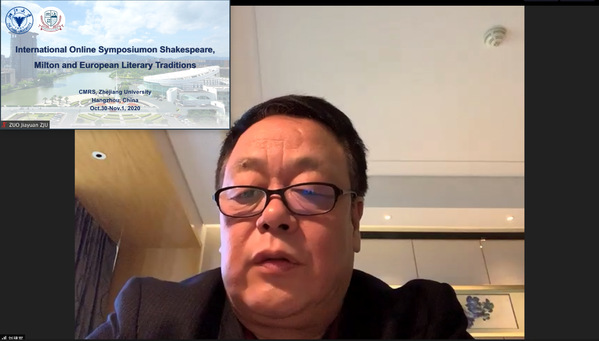
Prof. Liu Jianjun Delivering a Speech
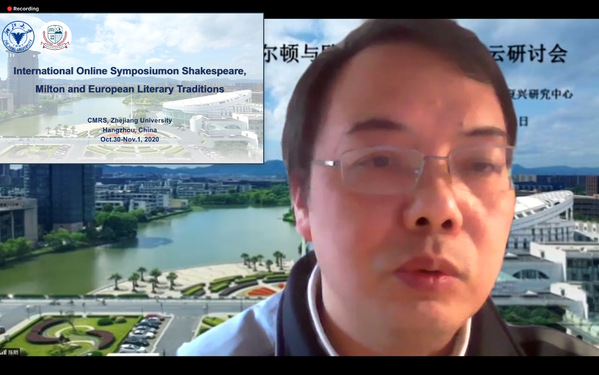
Prof. Chen Ming Delivering a Speech
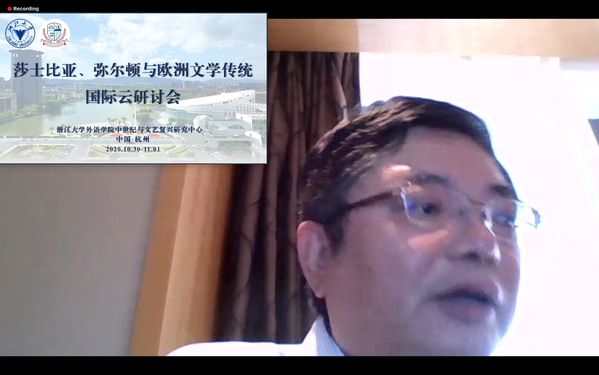
Prof. Wang Lixin Delivering a Speech
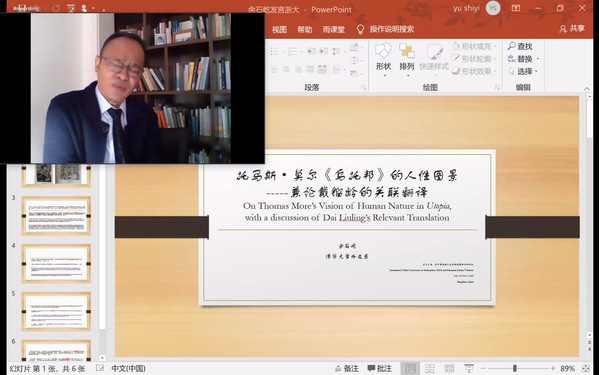
Prof. Yu Shiyi Delivering a Speech
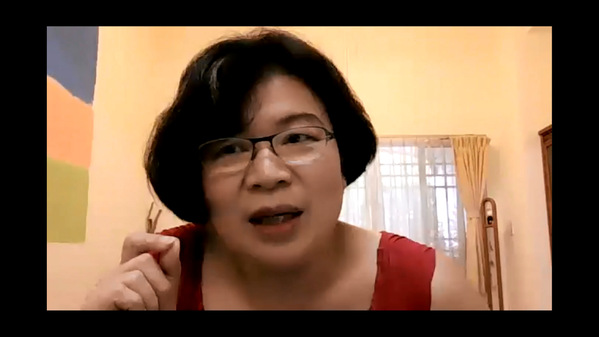
Prof. Wang Ming-Yueh Delivering a Speech
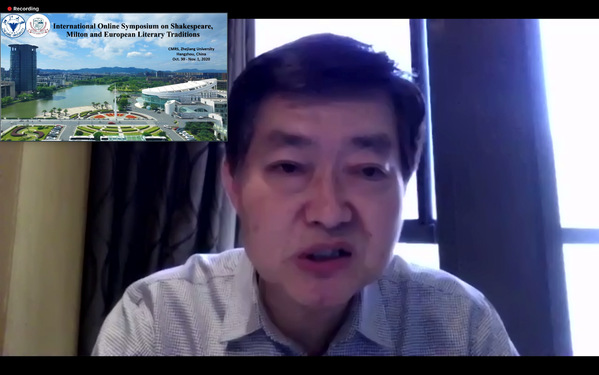
Prof. Li Weifang Delivering a Speech
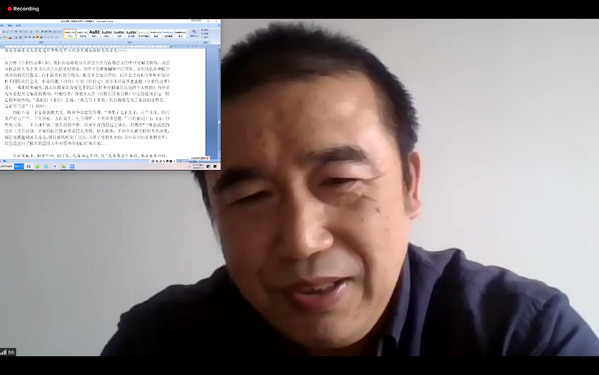
Prof. Shen Hong Delivering a Speech
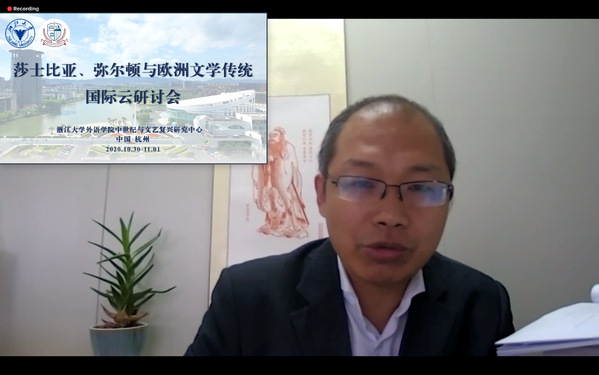
Prof. Hao Tianhu Delivering a Speech
There were in total 9 splendid seminars on Shakespeare, medieval European literature, Milton, European Literature in Renaissance period, European literature and world literature, etc., with participants sharing their research achievements and exchanging academic insights with full passion. Distinguished scholars in foreign language and literature including Prof. Yang Lingui, Prof. Wang Ming-Yueh, Prof. Yu Shiyi, Prof. Li Weifang, Prof. Chen Maolin, Prof. Gao Fen, Prof. Cong Cong, Prof. Liu Lihui, and Prof. Wang Xin, who had already reviewed each speaker’s paper before the seminar, remarked on these papers from a comprehensive and professional perspective. Young scholars were highly evaluated for their fresh academic viewpoints, enthusiasm, and problem digging and solving ability, and constructive suggestions were offered on the perfection of their studies.
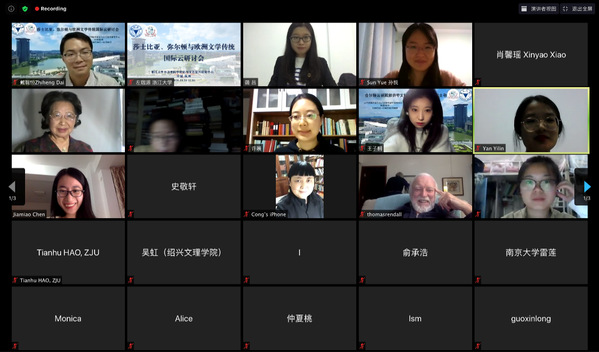
Panel Discussions
The closing ceremony, moderated by Dr. Zhang Lian, a researcher under the “Hundred Talents Program”, welcomed hosts of each seminars, namely, Prof. Li Shanghong, Associate Prof. Sun Yanping, Associate Prof. Xing Fengping, Associate Prof. Ning Xin, Associate Prof. Peng Jianhua, Associate Prof. Ding Guang, Associate Prof. Lv Wei, Associate Prof. Huang Jiayin, and Associate Prof. Li Limin, to deliver a summary on the discussions. Besides, Prof. Nicholas Koss, Prof. Wang Lixin, Prof. Wang Ming-Yueh, Prof. Shen Hong, Prof. Zhang Yan, and Prof. Yu Shiyi were invited to make summary speeches, all of whom spoke highly of the symposium for its high global and academic standards, extended warm gratitude to the CMRS for its hospitality and organization, and expressed their anticipation for more collaboration and communication and more diversified modes of academic exchange, such as the roundtable meeting proposed by Prof. Shen Hong. The organizing committee with Prof. Hao Tianhu as the chairman received special affirmation for providing such a precious platform for young scholars and senior experts to get acquainted with each other and conduct academic exchange. The guests also expressed their wish for the CMRS to be better. In his summary remarks, Prof. Hao Tianhu thanked the participants for their support, the audience for their active engagement, and the conference personnel led by Dr. Zhang Lian for their contribution.
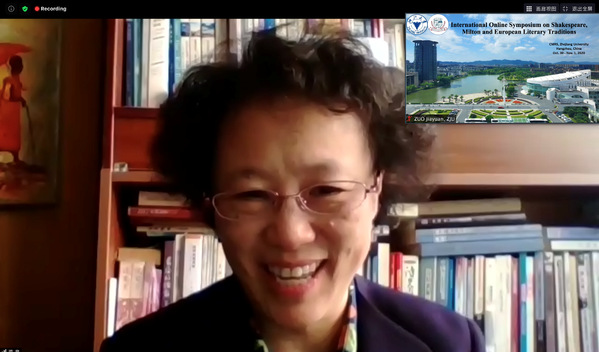
Prof. Zhang Yan Making a Summary Speech
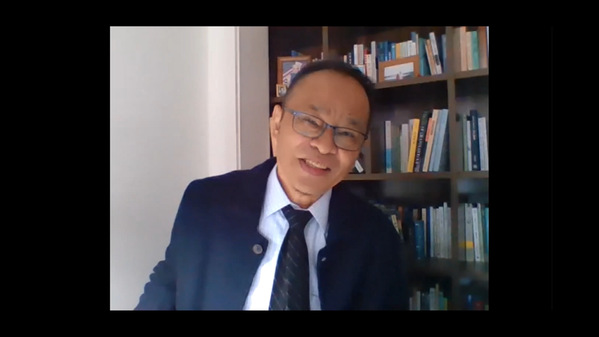
Prof. Yu Shiyi Making a Summary Speech
The scholars gave full affirmation of the symposium for its distinguishing feature of global academic exchange among senior experts, young scholars, and doctoral students from home and abroad, which was extremely rewarding and inspiring. The symposium was regarded as a feast of insights, and more similar conferences were expected to follow in the future under the organization of Prof. Hao Tianhu to provide more opportunities for scholars in China and the rest of the world to exchange ideas.
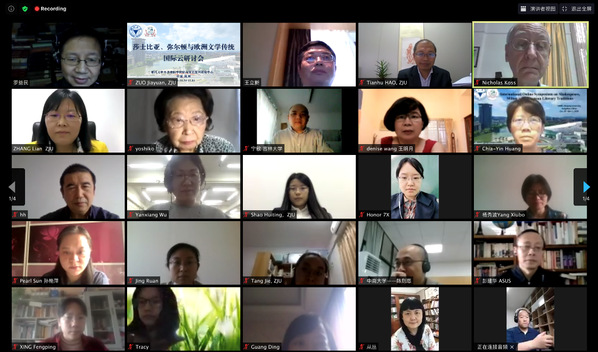
The Closing Ceremony
Written by Tang Jie
Photo by Zhang Lian, Zuo Jiayuan and Yan Yilin
Center for Medieval and Renaissance Studies of School (CMRS)
at School of International Studies, Zhejiang University
November 7, 2020
Translated by Mo Feifei
Proofread by Xu Xueying



